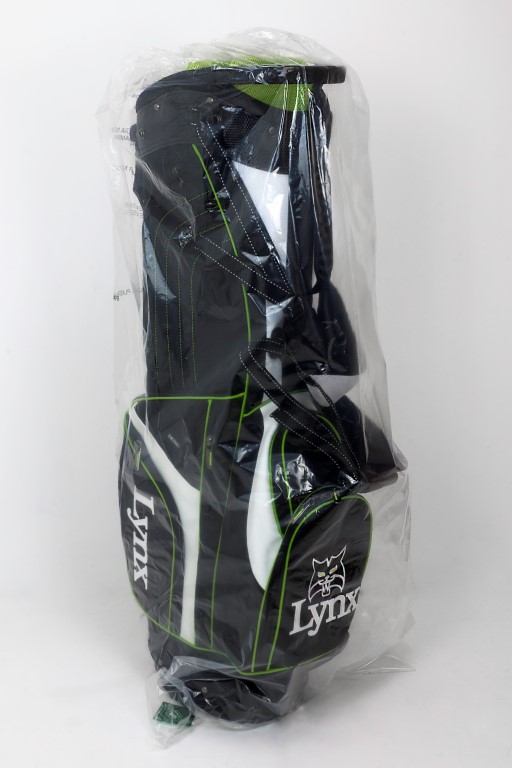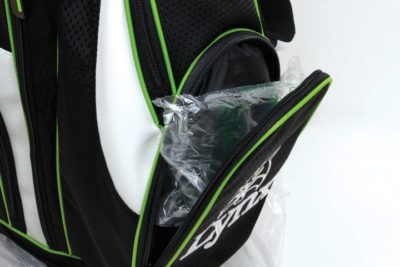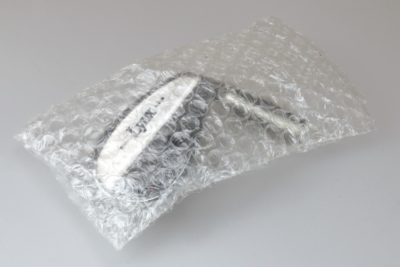A British golf equipment company will become the first in the world to rid itself of Single-Use Plastics (SUPs) with a 1st August deadline to complete major changes to its supply chain. Lynx Golf, based in Weybridge, Surrey, is a global sports manufacturing company, exporting its golf clubs, bags and other products all around the world, including the USA.
Owned by husband-and-wife entrepreneurs Steve Elford and Stephanie Zinser, Lynx Golf has committed to spending over £30,000 this year on alternatives for SUPs and to increase plastics recycling resources in its business, which employs just over 20 people.
Their aim is to be fully rid of SUPs by August 1st, with Stephanie Zinser, CFO, pledging: “Among our staff, we have over 42 children and a few grandchildren. We want them to have a world in which they can live safely, healthily and happily.
“There is no doubt that Sir David Attenborough’s ‘Blue Planet’ TV series really made the world sit up and think long and hard about our use of plastics and the damage they are having on the environment.
“The golf equipment business is not unique. Although its use of single-use plastics might not be as obvious as in other industries, there are SUPs all along the supply chain. At Lynx Golf we are determined to remove them.”
Lynx Golf has made several key changes to reduce its impact on the environment.
- Polyethylene (PE) plastic, used to wrap and protect its golf bags before they are packed in boxes, is being abandoned altogether or being replaced with paper. Longer-term, the company is investing in reusable and useful cotton drawstring bag covers on their golf bags.
- PE bubble plastic – used to pad out golf bag pockets so they keep their shape on display as well as bubble wrap packaging to protect shipping – is also being replaced with recycled paper wadding.
- Plastic parcel tape – used on cartons and boxes when importing equipment to the UK, then distributing it to retailers – is being phased out in favour of reinforced gummed paper tape.
- Plastic shrink wrapping, currently used on every golf club head component, will be removed altogether.
 Added Stephanie Zinser: “Lynx Golf will be the first global sports equipment manufacturing company to rid itself of SUPs, but that is not without its challenges.
Added Stephanie Zinser: “Lynx Golf will be the first global sports equipment manufacturing company to rid itself of SUPs, but that is not without its challenges.
“For example, when trying to replace the cellophane shrink-wrap we use on our golf club heads to protect them, we had sourced a Viskring/Celon alternative which is made purely from cellulose and which is quickly and completely biodegradable into harmless elements.
“However, in its current form it’s not quite there. We will keep working on the best alternatives, but we’d rather have nothing than something that is either not really biodegradable, or that is, but doesn’t quite look good enough.
“We are therefore using other – greener – methods to hold the golf club heads in place during transit and shipping and this comes at additional cost to the business.”
Where SUPs simply cannot currently be avoided – mainly due to product protection during shipping or deliveries of supplies from companies who don’t have an ethical plastics policy in place – Lynx is actively working on careful recycling and disposal plans, although this is also challenging.
Most industrial recyclers the company has spoken to will only accept a minimum weight of 1-tonne. This means Lynx is investing in special recycling bins and a baler, so it can store its waste plastics ready for recycling.
And while plastics can be recycled into many things, Lynx has been trying to find a recycler that can utilise its waste into something that will not end up polluting the environment.
Added Stephanie Zinser: “We felt that fuel pellets, while worthy on one level, also produce pollutants, and that is why we hope to be able to work with a company who uses waste plastics to produce plastic lumber, which is both useful and inertly non-polluting of the environment.
“Plastic, and it is a very important point to understand, will continue to be used and is a fundamental part of everyone’s lifestyle. Multi-use plastics are not going to go away, at least not for a very long time into the future. But what we can and need to get rid of NOW are the single-use plastic products used for packaging and delivery of products to consumers. These are really clogging up the blood vessels of the earth – our oceans, seas and rivers.
 “We have also investigated several products that claim to be ‘biodegradable’, but these are also made from petroleum-based products, as per normal plastic. And in order to degrade they use chemical additives in their formulation which require heat, light and oxygen – which they simply do not get when buried deep in landfill.
“We have also investigated several products that claim to be ‘biodegradable’, but these are also made from petroleum-based products, as per normal plastic. And in order to degrade they use chemical additives in their formulation which require heat, light and oxygen – which they simply do not get when buried deep in landfill.
“Similarly, when they do degrade they often only break down into micro-plastics and shreds and also contaminate our environment with harmful by-products. Even then, this process can take a very long time, assuming it even does work.
“The term ‘biodegradable’ can be a bit of a greenwash, as it’s not as simple as you’d think it was when you start digging into the subject. The only truly biodegradable plastic alternatives are bioplastics which are made entirely from plant-based materials, but their permeation into the wider packaging market has a long way to go still.
“So, there are challenges all the time, but we are determined to overcome them.”
Reasons To Bee Concerned
Not content with ridding the company and its products of SUPs, Lynx Golf are tackling another urgent ecological challenge: the decimation of the natural bee population due to loss of natural habitats, pesticide use and parasitic infection.
This small creature has such a massive impact on nature as 70 of the 100-crop species that provide 90% of food worldwide are pollinated by bees (Source: DEFRA, Bees’ Needs: Food and a home, 8 July 2016).
 In 2013, pesticide manufacturer Syngenta described bee health decline as among the biggest challenges facing agriculture (Source: House of Commons Debate Pack, 2017/0226) and the National Pollinator Strategy was set up to expand the public’s dedication to increasing food, shelter and nest sites across all types of land.
In 2013, pesticide manufacturer Syngenta described bee health decline as among the biggest challenges facing agriculture (Source: House of Commons Debate Pack, 2017/0226) and the National Pollinator Strategy was set up to expand the public’s dedication to increasing food, shelter and nest sites across all types of land.
Said Stephanie Zinser: “Some have stated that the human population would starve within four years if bees were extinct – certainly, we do know that we would lose many of our fruits and vegetables and that supermarket offerings would be slashed by at least 50% without bees. Almonds, which rely entirely on bees for pollination, would cease to be a viable crop; the many knock-on effects would be invasive and more massive than you might at first think.
“We believe that everyone can help, and this is why we are also sending out packets of bee-friendly seeds to all our customers who buy boxed products from Lynx – golf bags, irons etc – so they can be part of the challenge to see just how much of an impact we golfers can make in halting the decline of these fuzzy winged ‘farmers’ who do such an important job in agriculture.
“Our eco-friendly strategies are all about bringing like-minded people along with us on this journey, and we very much hope that our actions by going SUP-Free will encourage everyone who knows us, partners with us, and plays with us, to come along and join in the adventure.
For more information visit www.lynxgolf.co.uk/, or follow @LynxGolfUK on twitter


